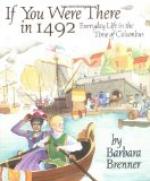Poor Columbus! His chains lay very heavily upon him. He insisted, however, upon not having them taken off, unless by royal command, and would ever keep them by him, ("I always saw them in his room,” says his son Ferdinand), ordering that they should be buried with him. He did not know how many wretched beings would have to traverse those seas, in bonds much worse than his, with no room allowed them for writing, as was his case,—not even for standing upright; nor did he foresee, I trust, that some of his doings would further all this coming misery. In these chains Columbus is of more interest to us than when in full power as governor of the Indies; for so it is, that the most infelicitous times of a man’s life are those which posterity will look to most, and love him most for. This very thought may have comforted him; but happily he had other sources of consolation in the pious aspirations which never deserted him.
We have come now to the end of Columbus’s administration of the Indies. Whatever we may think of his general policy, we cannot but regret his removal at the present time, when there appeared some chance of solidity in his government: though we must honestly admit, that the Catholic Sovereigns, with such evidence as they had before them, were far from wrong in recalling him, had it been done in a manner worthy of his and of their greatness.
CHAPTER XI.
Reaction at court.
The career of Columbus had already been marked by strong contrasts. First, a “pauper pilot,” then the viceroy of a new world; alternately hoping, and fearing, despondent, and triumphant, he had passed through strange vicissitudes of good and evil fortune. But no two events in his life stand out in stronger contrast to each other than his return to Spain after his first voyage, and his return now. He was then a conqueror; he was now a prisoner. He was then the idol of popular favour; he was now the unpopular victim of insidious maligners. In truth, the contrast was so startling as to strike home to the hearts of the common people, even of those—and there were many such—who had lost kinsmen or friends in that fatal quest for gold which the admiral had originated and stimulated. The broad fact was this: Columbus had given Spain a new world; Spain loaded him with fetters in return. There was a reaction. The current of public opinion began to turn in his favour. The nation became conscious of ingratitude to its benefactor. The nobility were shocked at the insult to one of their own order. And no sooner had the Sovereigns learned from Columbus of his arrival, and of his disgrace, than they issued immediate orders for his liberation, and summoned him to their court at Grenada, forwarding money to enable him to proceed there in a style befitting his rank. They then received him with all possible signs of distinction; repudiated Bobadilla’s arbitrary proceedings; and promised the admiral compensation and satisfaction. As a mark of their disapprobation of the way in which Bobadilla had acted under their commission, they pointedly refused to enquire into the charges against Columbus, and dismissed them as not worthy of investigation.




